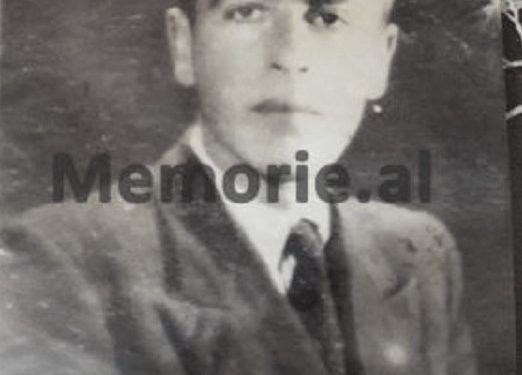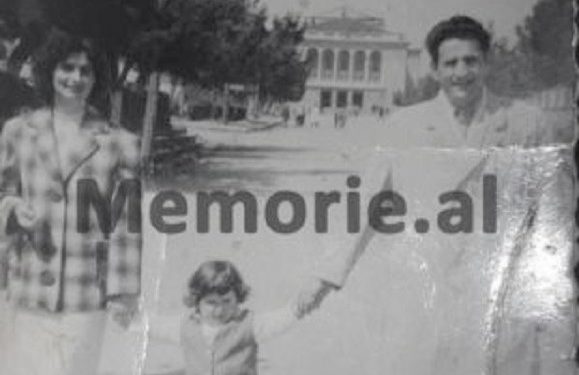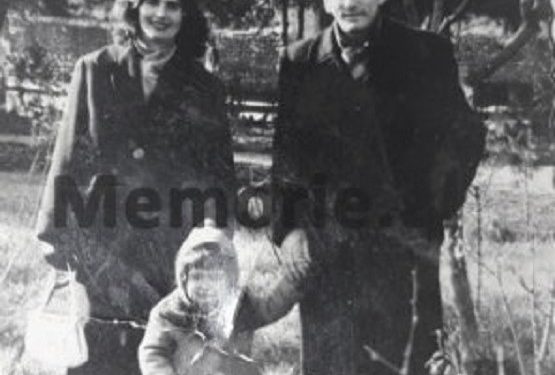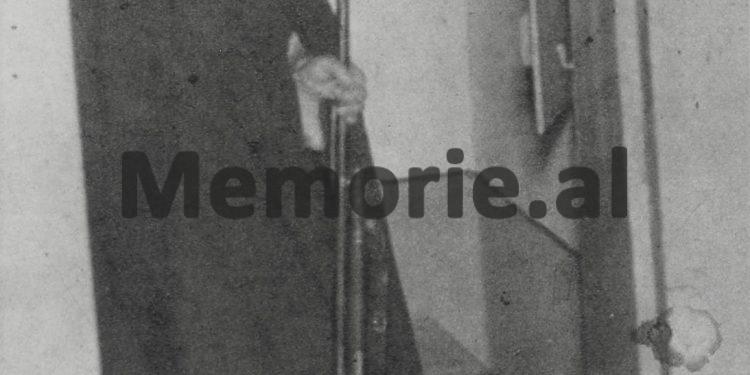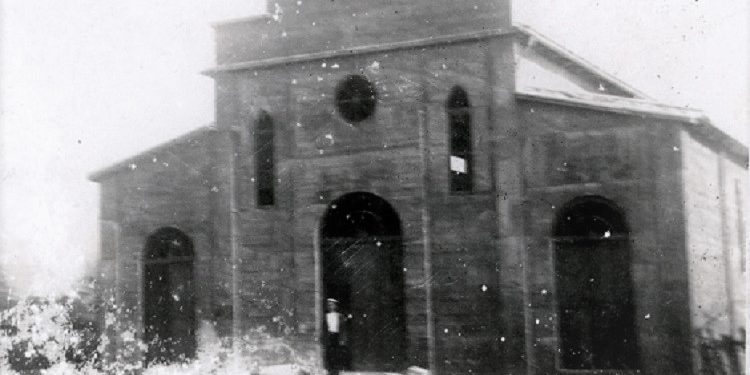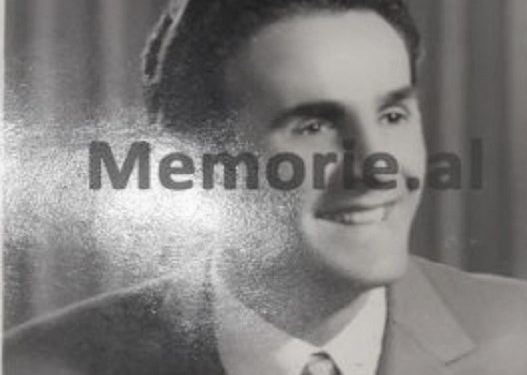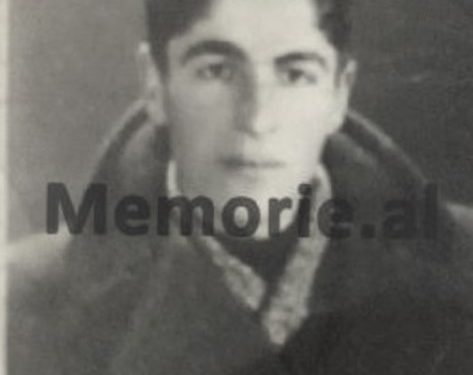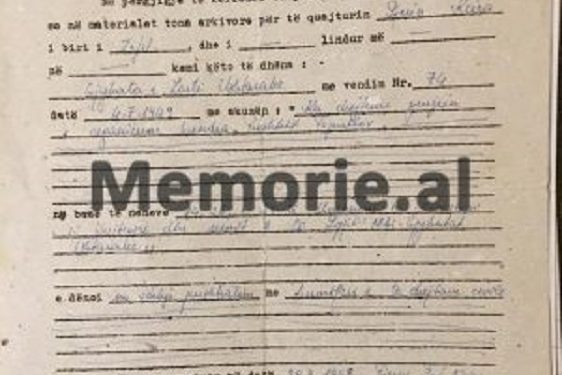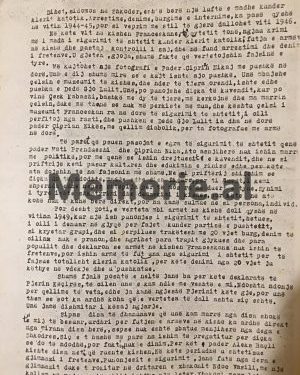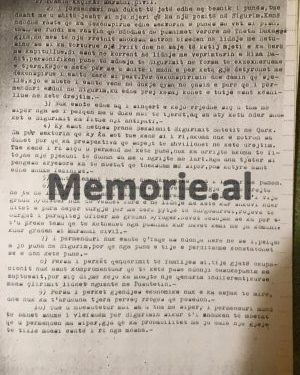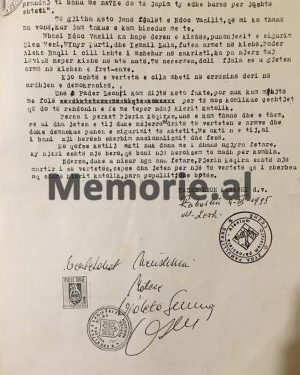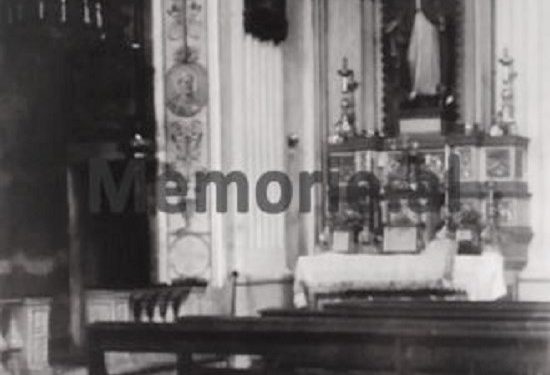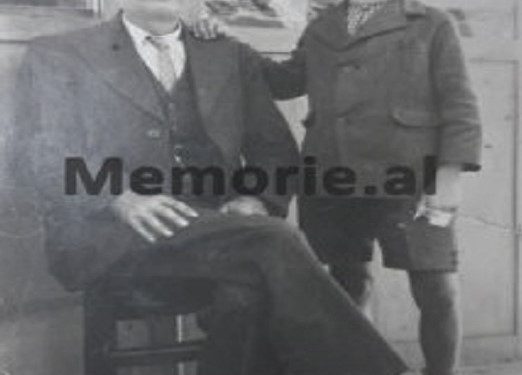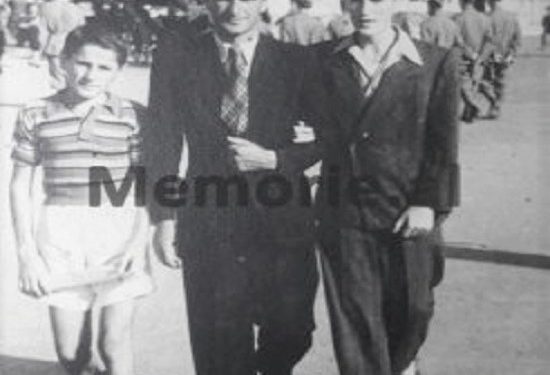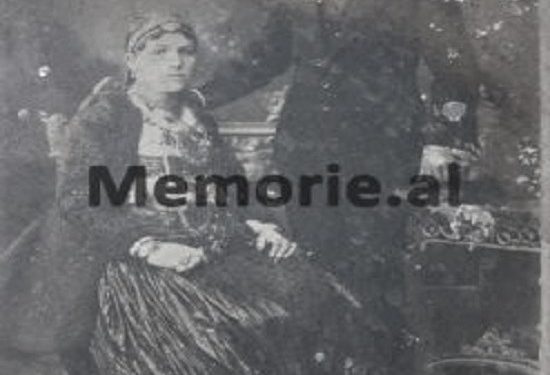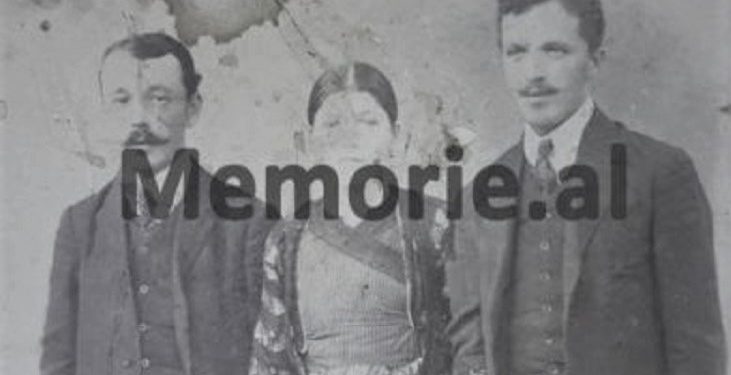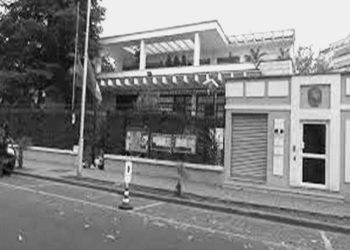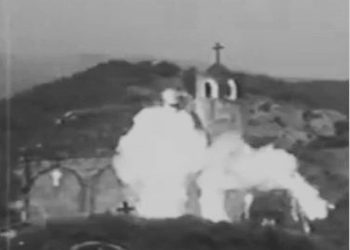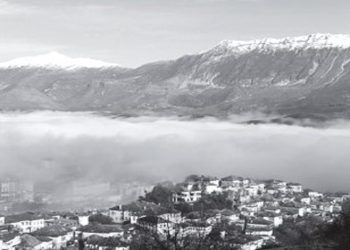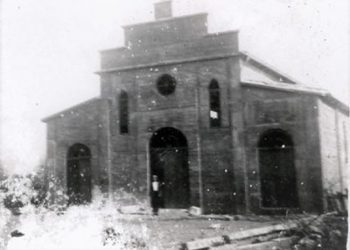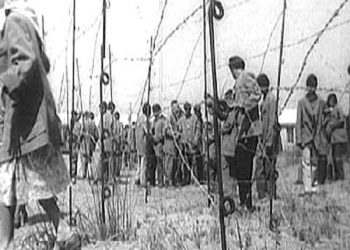Dashnor Kaloçi
Second part
Memorie.al/ publishes the unknown story of Pjerin Kçira, from the city of Shkodra, who immediately after the end of the war, was mobilized and served as a journalist, correspondent of the newspaper “Voice of the People” and then an investigator and non-commissioned officer of the State Security. in the Department of Internal Affairs of Shkodra, where he worked for only 13 months, until 1948, when he was arrested and accused of being “head of an anti-party group that had distributed tracts with content against popular power”. Kçira was initially sentenced to 20 years in political prison, after he declared in court that the weapons in the Franciscan Church, on November 17, 1946, had been introduced by the State Security itself, and then the death penalty and his shooting, after had deconspired the staging of the State Security. The rare testimonies of Father Leon Kabashi, one of the witnesses of the “Guns in the Church” event (which is considered one of the most sensational in the history of the communist regime in the fight against the Catholic Clergy) and some of the former political convicts from the city of Shkodra, who show how the former journalist, investigator and sub-officer of the State Security, Pjerin Kçira, saved them from torture and death sentences, by manipulating the investigative process in their favor.
“But God willed it, the truth about ‘weapons in the church’ came out as early as 1949, when a former employee of the State Security, an investigator, who was convicted in a court of law for crimes against the ruling party, as a group leader and as compiler of tracts, with 20 years in prison, a sentence he does not accept and stands before the jury and before the people and declares that: ‘the weapons in the Franciscan Church did not belong to the friars, but were weapons brought in by the State Security, to blame totally the Catholic Clergy’ and for this the sentence of 20 years was returned to death, and he was shot.
Many words, up and down, have been made about this statement by Pjerin Kčira, which I have felt with my own ears. Maybe someone for their own purposes has also compressed this thing to Pjerini, but I say that today, the time has come for the truth to come out as it is. I am a witness of this event”.
This is what was expressed, among others, in a public statement made on March 4, 1995, Father Leon Kabashi, one of the political prisoners, who suffered for years in the prisons and internment camps of the communist regime of Enver Hoxha. regarding the much talked about incident of “weapons in the church” that happened in the city of Shkodra on the night of November 17, 1946, where the State Security “found weapons” in the Church of the Franciscan Frets!
From that day until the collapse of the communist regime, the official historiography and propaganda of that time considered and presented that event as a “hostile action of the Catholic Clergy based in Shkodër, which also filled the religious institutions with weapons, for to fight popular power”.
Regarding the truth of that event, a former investigator and employee of the State Security, named Pjerin Kçira, testified in the trial against him, where he was accused as: “Chairman of an anti-party group that had published tracts with hostile content, against the people’s power”, declared that: The State Security had introduced the weapons into the church itself and by means of torture, had forced the Catholic priests to declare that they had introduced those weapons”. After that, the trial against Pjerin Kçira was interrupted and after they took the people out of the hall, from the 20 years that the sentence had been given for him, Kčira was sentenced to death, shot and executed.
Regarding this event, one of the most talked about in the history of the communist regime of Enver Hoxha in his fight against the Catholic Clergy, Memorie.al has provided some archival documents obtained from the Archives of the Ministry of Internal Affairs, where in addition to a document containing ‘ The characteristic’ (line of work) of Pjerin Kçira signed by the former Head of the Department of Internal Affairs of Shkodra, Zoi Themeli, where he (Kçira) was effective, there is also the document with the tract (communication) with anti-communist content who had dispersed the “anti-communist group” headed by Pjerin Kçira, for which they were arrested and sentenced.
Likewise, in addition to these archival documents, Memorie.al has also secured various testimonies from former political prisoners from the Shkodra district, which shed light on that distant event (one of the most talked about during the communist regime) of happened at midnight on November 17, 1946, otherwise known as the “gun incident in the church”, as well as for Pjerin Kčira, the idealist communist and investigator and employee of the State Security, who not only did not admit in 1946, that to write an article about that event when he was a correspondent of “Zeri i Populli”, but in his trial, he told the truth, openly exposing the intrigues and machinations of the State Security, in an attempt to justify the attack on the Catholic Clergy.
Continued from the previous issue
The testimony of the former death row inmate: “I dedicate my life to Pjerin Kçira, he found me hanging from a tree and took me to the hospital”
D E C L A R A T E
The undersigned Ragip Fetah Meto, born and resident in Shkodër, certify as follows:
On April 6, 1946, I was arrested by the Security of Shkodra, and investigations began immediately. I spent 16 months in the interrogator removing the most inhumane tortures and in November 1947, I was sentenced to death.
During the investigation, I informed Pjerin Kçira, who found me in torture and in one case found me hanging from a tree, 6 days without food and without drinking water. He helped me personally, taking me to the hospital in Shkodra, after they saw that I was in a serious condition, dying.
Only Pjerini’s care saved my life. He did this on his own initiative, as he was not my investigator. My investigator was the vice president of the Branch.
So once again, I dedicate my life to Pjerin Kčira. From my prison mates, I never heard any complaints about his behavior towards them.
I leave this statement to his family, to use where needed.
Dt. 8.II.1993 Declarant
Ragip Feta Meto
Testimony: “Investigator Fadil Kapisizi tortured me inhumanely, while Pjerin Kçira saved me from being shot and I was sentenced to only 3 years”
A former political prisoner, Met Licaj testifies:
I was arrested and for six months in a row, I was inhumanely tortured by Fadil Kapisizi. One night, at 12 o’clock, they take me and take me to the investigator. It was Pjerin Kçira. After he got the policemen out, he started asking me about the case and I answered him, admitting nothing.
The next night he asked me the same questions and I gave him the same answers. But in that room, where I thought it was just the two of us, there was also the hidden witness, whom Pjerini brought out as evidence. I recognized him immediately, he was also arrested.
He put us in front of each other and told him to speak. The arrested witness began to speak. His words were true, but I in no way accepted anything and strongly objected. Then Pjerini turned from the witness. He called the police and took him out. After everyone left, he untied my hands and told me to sit down. He continued: “Don’t remember that you threw it at me, I know everything, I know that even the words of the witness are true. But you are a man and you stick to it, and I help people who stick to their word. Now you know who Pjerin Kçira is. I’m asking you something: Do you have faith?
And then he continued: You have the decision to be shot, but if you are lucky, I will stay with you until the end of the investigation, you will neither be shot, nor will you be severely punished. If they take me to another investigator, you will tell them like this: “Torture me, beat me, drown me, do whatever you want with me, except in the hands of Pjerin Kçira, don’t take me there.” Now tell me what you want from me. You told him to do everything possible, don’t squeeze my hands tightly in the handcuffs, and gave me some bread and tobacco. He indirectly fulfilled all these requests.
We all know how much the defendant’s words were worth before the jury, but the process that the investigator Pjerin Kçira had for me, meant that I was not only not shot, but only sentenced to three years in prison. Pjerin Kçira, he was the one who saved my life. Later, when I was in prison, I found out that Pjerin Kçira had been shot.
With respect
Met Licaj
Dr. Pjeter Pepa: “Here’s the truth about the ‘Guns in the Church’ incident”
When Father Çiprian Nika testified: “I don’t have the weapons behind me. There were some rubbish left by the Germans, a long time ago, when they had taken refuge and lived in our seminary”, he thought that it was about 3-4 rubbish left behind, as trophies after the Germans had left, and he honestly said that too, without knowing that he would appear in the picture, next to a bunch of brand new rifles, which were introduced one morning, in that assembly and that church.
“A man has the duty to always tell the truth, but not to tell all the truths”, – ordered Aristotle, but it was the time of Lilo Zenels and not of the Aristotles.
“We put the entire archive with historical value into two large chests,” Father Zef Pllumi testifies. – It was an immense wealth of documents, of the National Renaissance, as well as the writings, letters, memories and manuscripts of Luigj Gurakuqi, Hasan Prishtina, Mr. Doçi, Mr. Bumçi, etc. There were also Gjeçov’s documents, Fishta’s fund, etc. We generally arranged the manuscripts in metal suitcases, which had once been ammunition boxes and had been left empty by the Germans because they were suitable against moisture. And the painful irony consisted in the fact that in books, magazines and exhibitions, they took out our pictures in front of those boxes, accompanied by the signature: ‘Here is the ammunition hidden in the church, in those boxes that, with their German writings, had something like this connected with the ammunition…’ Of course, this was a ‘small’ mischief of the Security, difficult for anyone to understand”.
“When the light came out,” says Father Zef Pllumi, “the Security forces brutally broke up the assembly, gathered all the friars, organized that ‘fine check’ up to the altars and in one of them, they found a lot of weapons…”. They took all the friars out to the courtyard, most of them ended up in handcuffs, slapped and spat on, kicked and cursed, which had never been seen in any country in the world. The assembly was trampled in such a way that the surrounding residents still don’t forget it today. It didn’t take long and the guests and the authorities did it. Yugoslav television cameras were immediately present to document this event, the fire of which had just been set.
And in the face of this truth, this is how the propaganda was made: “The numerous weapons and of different types, which were found hidden in the seminary, assembly and other institutions, – affirms the Franciscan provincial Mati Prendushi, – we guarded them very carefully. Weapon depots, a part of rifles, machine guns, bombs and mortars and the corresponding ammunition, we took from the Italian army”. (Rakip Beqja, p. 72).
In the altar of the heart of Christ, in the former Franciscan church Shkodër, above and at the bottom of it, weapons of war (cartridges, machine guns and bombs) are hidden, to be used against the popular power. (Idem. p.80).
“In the altar of Saint Ndou, in the Franciscan church, weapons were found. A few days later, even in the big church in Shkodër, German-made war weapons and boxes of ammunition were found”, – it is said in another place. “On December 16, 1946, the State Security section discovered in the Mirdita abbey, inside the church and in the cell, weapons and other compromising materials”, – announced the head of the Mirdita Security, Lieutenant Bardhok Biba.
“In 1946, weapons of war, rifles, bombs and machine guns, hidden by the clergy in the archdiocese of Shkodra, were discovered in large quantities… Priest Donat Kurti, having broken down the wall of his room, shows the place where the cache of hidden weapons was located, that the Catholic clergy had received from the Germans”, – it was said in another place.
In the face of this propaganda that was made in the national and international opinion, how could the truth be revealed, when the only witness was God and brother (brother) Ndou, the gatekeeper of the church? He refused to hand over the keys and open the gate, to let in the new powderless guns, long rifles and polished Mausers, at about 4.30 in the morning of that black day. For this action, they massacred him as if not worse!
“We were in Ulcinak prison,” recalls Terezina Zorba. – At night they came and took Father Mati Prenduš. The next day, he told us that together with Father Pal Doda, Donat Kurti and Čiprian Nika, they took them to the Franciscan church, opened Shna Ndou’s altar, put rifles and machine guns on their arms and photographed them several times.
- ACT TWO – THE TRUTH IS REVEALED
Only God knew the truth and Brother Ndou, the porter, who had been asked for the keys… but now even he could not speak, because he too had been taken to God… What could he have left unsaid this bloody drama? Not even four months have passed since the shooting and a new wave of arrests erupts again in Shkodër, sensational and very special for its type. The special thing was the arrestees. It is a group of young people, 20-25 years old, three of whom are not only party members, but also State Security employees.
On July 28, 1948 will be arrested:
- Pjerin Kçira- 25 years old, party member, aspirant in the Shkodër security section, correspondent of “Voice of the People”.
- Gjovalin Mazreku – 20 years old, party member, captain in the security section, Shkodër.
- Lin Çollaku – 23 years old, party member, captain in the security section, Shkodër.
- Zef Bardhoku – 24 years old, party member, clerk.
- Nush Simoni – 22 years old, bank clerk.
Even for them – the usual ritual. And what was the charge?
Of course, it would quickly become one for them as well…!
Minutes: The Military Prosecutor’s Office of Tirana operating in Shkodër, with its Indictment dated 26.5.1949, brings for trial to this court the criminal case for the defendants Pjerin Kçira… with friends that:
– They were members of a group organized in secret meetings.
– They did agitation and propaganda by word of mouth and in print.
– They made decisions to carry out assassinations against party and government functionaries and they wanted to carry out an assassination against a member of the security, but did not carry out for fear of being dictated to… etc.
When was it formed and what was this group?
Based on the documents, it appears that the group was created on July 18, 1948, and that in a regular meeting with votes they elected Pjerin Kçira as chairman.
“Koçi Xoxe did not dominate the first secretary of the party, E. Hoxha, therefore the latter is guilty and responsible for everything that was happening in Albania”. This was the opinion of the members of this group in that turbulent period, when a “treason” was discovered in Albania and later (March 3, 1949) the mandate of Koçi Xoxes and Pandi Kristos was removed (Archive of the People’s Assembly). So, the group’s activity turns out to have been discovered at the top of ten days… Was it an enmity or a trick organized by Sigurimi, which did not even spare its own servants when it was necessary to eliminate traces?!
And, the investigations will last eleven months, and of course the tortures with special devotion were carried out by Ali Dhunga, Kasem Troshani and many others, who until yesterday had been their friends…! Even during the judicial process, the defendants accuse of these tortures and the above are forced to come and testify in the trial as requested by the defense. But of course, it could not happen otherwise. It was proven “for sure” that the statements of the defendants were obtained “without any coercion or pressure”! They are also accused of assassinations that they wanted to do against Abaz Laze, Lilo Zeneli, Ali Beg, etc.
And… another record:
“Today, on 28.5.1949, the jury, consisting of the first captain, Vangjel Kocani, chairman, and lieutenant Haxhi Beqiri and captain Ali Tirana, members, with the prosecutor, the first captain, Harito Nashin, opened the trial against the defendants. ..”
In order to reach the claim of the prosecutor who sentences Pjerin Kçira and Nush Simon to 20 years, Zef Bardhoku to 15 years, Gjovalin Mazreku to 13 years and Lin Çollaku to 8 years. The next day, on 11.6.1949, after the formal defense, the court sentenced Pjerin Kçira to death by firing squad and everything came to an end. This, at least officially based on archived documents.
Pjerin Kçira is sent to Zalli i Kiri and shot, as many others were shot before him and as many others would be shot after him.
Where is the special? Unfortunately, the archive documents do not reach us
help… They have either disappeared, or have been purposely changed so that the secret that connects these two acts of this bloody drama is not mentioned at all.
Perhaps the special thing had started earlier… It had started since when Pjerin Kçira from A-P returned to A-P, but with a very big change… So, from a party member, to an enemy of the people. Once, a party member with privileges and favors. Former state security aspirant and church prison warden. Once, investigator of Father Mark Harapi, Dom Anton Muzaj and many others. Once, popular and powerful with friends and associates, security officers and investigators. Now, again a-p, but with the black stamp as an enemy of the people. So, the antipode of what it used to be; from the persecutor, to the persecuted and so immediately and suddenly…!
For the sake of truth, it must be affirmed that the young men had shot bravely and accomplished a trial that would long be remembered for its kind. All 16 sessions would continue one after the other, to reach the climax, when the president of the court will shut Pjerin Kçira’s mouth. He, in order to clear his conscience, reveals a secret that has been burning him for a long time, but which would fall like a bomb on the judging body and on the entire hall:
“Don’t think that you are doing with me as we did with the Catholic clergy, putting their weapons into the church and forcing them through inhumane torture to admit that they are theirs… To cover up your and E. Hoxha’s indignities, you want to punish innocent people!”.
Of course, this completely shocked the president of the trial body, who until then was barely holding himself and mastering the situation. There was no other way. The session had to be closed.
– For those of us who had the turn to be judged after Pjerini, – testifies Ernest Përdoda, – the trial would be held behind closed doors… His statement about bringing weapons into the church had instilled fear…
While the fellow sufferer of the cell, Mr. Ahmet Bushati, remembers the last moments: “They came singing the national anthem and as soon as they put him in the dungeon, with the signal we had, he immediately started telling me about his attitude and the court decision…! I tried to convince him that they can’t shoot him, but he calmly answered: – No, no! I know that they will shoot me, I’m sure, because I debunked them where it hurts the most, but I did mine.”
– The next day we parted because Pjerin was taken to the Gestapo Prison. – It was 1949, – remembers former prisoner Gjon Ljarja. I was arrested in the security prison, called the Gestapo Prison. Pjerin Kçira, who was sentenced to death, was put in a dungeon-necessary, where death row prisoners were usually kept, those days! One morning I heard the bars of the doors open and someone entered him, and as soon as he left, Pjerini began to sing loudly: “But like the leaf of God” and other patriotic songs… From dinner he could tell me that they had informed him of the shooting and that at lunch he also met with his mother and fiancee for the last time before the shooting.
– We wanted to give him hope, – continues another witness, – telling him that we intervened in Tuk Jakova and that his life would be spared, but again no!
– Everything is over! – was Pjerini’s answer, – just please bring me a priest so that I can confess for the last time. And if they will not allow him as a priest, let him disguise himself and dress as a peasant and come to me, because I am definitely waiting for him for the last confession”. Mr. Gjon Ljarja continues: – Around 10 pm we heard the noise of keys and doors again; we lost our minds. Pjerini began to shout loudly: “Goodbye, make me halal, friends!” And so, he went out into the yard as the sound of a car’s engine starting up filled everything. Then, grave silence again…! Memorie.al




